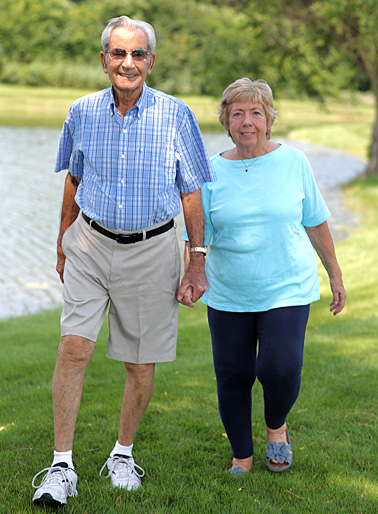Robert Gayer, 74, was mowing his grass on a hot day in 2010 when he started to struggle to breathe.
“I kept going to sit down in the garage, and then I would start mowing again when I felt better,” he said.
This went on for most of the day until Gayer drove to his then-fiancée’s house.

Robert and Sharon Gayer took a walk at their home last month. Robert had the first percutaneous closure of a mitral paravalvular leak at UT Medical Center in May.
This was the start of a series of health problems that wouldn’t end until May 1 of this year when Dr. George Moukarbel performed the first percutaneous closure of a mitral paravalvular leak at The University of Toledo Medical Center. The complex procedure had never been done at UTMC.
“It’s the day I got my life back,” the Maumee resident said.
The complicated surgery required the UT Health cardiologist to go up through Gayer’s groin with a catheter, cross the right atrium of the heart, and then navigate into the left atrium before delivering a plug to the hole next to his prosthetic heart valve.
“This is one of the most challenging and risky cardiac procedures being done in the country,” Moukarbel said. “It is only done in referral specialized centers, which as of May 1 includes UTMC.”
When Moukarbel first met Gayer, they talked about options: Do nothing, which would continue to diminish his quality of life; open him up again for another heart surgery; perform the percutaneous closure procedure.

Dr. George Moukarbel performed Robert Gayer’s percutaneous closure of a mitral paravalvular leak, the first at The University of Toledo Medical Center.
The most recent leak left him short of breath, faint and low on energy because the blood wasn’t flowing properly to his heart. He wasn’t able to fish or travel as much. His health was a continual concern.
“We didn’t want to open him up again unless we really thought that was the only option,” Moukarbel said. “I had done this specialty procedure at Brigham and Women’s Hospital, and I thought it would be a good fit for Robert because it was less invasive and the recovery was less difficult.”
Gayer’s wife didn’t like the idea of her husband “being the first,” but she asked their longtime cardiologist, Dr. Christopher Cooper, executive vice president for clinical affairs and dean of the College of Medicine and Life Sciences, “What would you say if it was your dad?”
Cooper told him to go with the percutaneous closure.
“I had the utmost confidence in Dr. Moukarbel’s skill as an interventional cardiologist, and I knew that Robert was a good candidate for this type of procedure,” Cooper said.
Just days after the surgery, Gayer walked into his follow-up appointment — no walker or wheelchair.
“It was amazing to see him walk in so full of energy and life,” Moukarbel said. “If he had underwent open heart surgery, he would have still been at the hospital.”
“I was only in the hospital for five days with this procedure,” Gayer said. “Normally, when I had open surgery in the past, I had to stay in the hospital for a long time and then when I got home, I was laid up for a few months.
“I was scared to be the first person to have this procedure at UTMC, but after talking with Dr. Moukarbel and hearing him explain how it was to be done, I had confidence,” he said. “I am glad I was the first person because now others might not be as scared.”